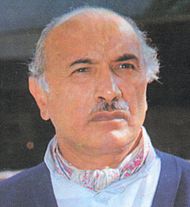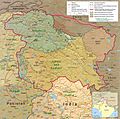Asghar Khan facts for kids
Quick facts for kids
Air Marshal
Muhammad Asghar Khan
|
|
|---|---|

Asghar Khan (1921–2018)
|
|
| President of Pakistan International Airlines | |
| In office 20 August 1965 – 30 November 1968 |
|
| Preceded by | Mirza Ahmad Ispahani |
| Succeeded by | Air-Mshl. Nur Khan |
| Director-General of the Civil Aviation Authority | |
| In office 1965–1968 |
|
| Commander in Chief of Pakistan Air Force | |
| In office 23 July 1957 – 22 July 1965 |
|
| President | Ayub Khan (1960–65) Iskander Mirza (1956–59) |
| Deputy | Air-Mshl. Sharbat Changezi (Deputy Air Cdr-in-C) |
| Preceded by | AVM Arthur McDonald |
| Succeeded by | AM. Nur Khan |
| Chairman of the Solidarity Movement | |
| In office 29 June 1970 – 12 December 2011 |
|
| Preceded by | Party established |
| Succeeded by | Imran Khan |
| Personal details | |
| Born |
Mohammad Asghar Khan
17 January 1921 Jammu, Jammu and Kashmir, British India (present day in Jammu, Jammu and Kashmir, India) |
| Died | 5 January 2018 (aged 96) Combined Military Hospital in Rawalpindi, Punjab in Pakistan |
| Cause of death | Cardiac arrest |
| Resting place | Abottabad, Khyber-Pakhtunkhwa, Pakistan |
| Citizenship | British India (1921–1947) Pakistan (1947–2018) |
| Political party | Pakistan Movement For Justice (2012–2018) |
| Other political affiliations |
Solidarity Movement (1970–2012) National Democratic Party (1964–1970) |
| Civilian awards | |
| Nicknames | Shaheen-i-Pakistan Night Flyer |
| Military service | |
| Allegiance | |
| Branch/service | |
| Years of service | 1939–68 |
| Rank | |
| Unit | 9th Deccan Horse, Armored Corps |
| Commands | Pakistan Air Force Academy Deputy Commander-in-Chief of the Air Force, Air AHQ Peshawar Air Force Base No. 9 Squadron, RIAF |
| Battles/wars | World War II First Burma Campaign
|
| Military awards | |
Air Marshal Muhammad Asghar Khan (1921–2018) was a famous Pakistani politician and writer. He was also a strong supporter of peace and human rights.
Asghar Khan came from a military family. He first served in the Indian Army and then joined the Royal Indian Air Force in 1941. He fought in World War II in Asia. After Partition of India in 1947, he joined the Pakistan Air Force (PAF).
In 1957, at just 36 years old, he became the Commander-in-Chief of the PAF. This made him the youngest officer to lead a military branch in Pakistan at that time. He retired from the military in 1968.
After leaving the military, Asghar Khan started his own political party called Tehrik-e-Istiqlal (Solidarity Party). He wanted to bring about positive change in Pakistan's politics. In 2011, his party joined with the Pakistan Tehreek-e-Insaf. Asghar Khan passed away in January 2018 and was given a state funeral.
Contents
Life and Military Career
Early Life and Joining the Air Force
Mohammad Asghar Khan was born on January 17, 1921, in Jammu, which was then part of British India. His family was Pashtun and had a military background. His father, Brigadier Rehmatullah Khan, was an army officer.
His older brother, Brigadier Aslam Khan, also became a respected officer in the Pakistan Army. He was known as the "Legend of Baltistan" for his role in Pakistan's first war with India.
Asghar Khan went to the Royal Indian Military College in 1933. After finishing school, he joined the British Indian Army in 1939. In 1941, he moved to the Royal Indian Air Force.
He served as a military adviser and flew bomber missions during the Burma campaigns against Japan in World War II. He was one of the first Indians to fly the Gloster Meteor jet fighter in 1946.
After World War II, he became a flight instructor. In 1947, he decided to join the newly formed Pakistan Air Force. He continued his military education in the United Kingdom.
Leading the Pakistan Air Force
After Pakistan was created, Asghar Khan became the first leader of the Pakistan Air Force Academy in 1947. He also commanded the Peshawar Airbase. In 1948, he met Muhammad Ali Jinnah, the founder of Pakistan, when Jinnah visited the academy.
In 1957, Asghar Khan became the first Pakistani Commander-in-Chief of the Pakistan Air Force (PAF). He was only 36 years old, making him the youngest person to hold such a high position in the Pakistani military. His rank was later upgraded to Air Marshal.
During his time as Air Chief, he worked closely with the U.S. Air Force. He helped train Pakistani pilots to fly advanced military aircraft. He also started the Air Force Education Command. This led to the creation of the PAF Air War College and the College of Aeronautical Engineering.
In 1965, he disagreed with the army's plans for a secret operation in Indian-held Kashmir. He believed it would lead to a full-scale war with India. He also said that the Air Force and Navy were not fully informed about these plans.
Before the Indo-Pakistani War of 1965 started, Air Marshal Khan spoke with the Indian Air Force Chief. They both agreed to try and avoid bombing each other's cities. He warned President Ayub Khan that a provoked India would likely respond with an all-out war.
Soon after, in August 1965, Air Marshal Asghar Khan was replaced as Air Chief. However, by then, he had helped make the Pakistan Air Force a very strong part of the country's armed forces.
Leading Pakistan International Airlines
After leaving the Air Force, President Ayub Khan appointed Asghar Khan as the President of Pakistan International Airlines (PIA). He continued to serve with his military rank.
At PIA, he learned to fly commercial planes and got his commercial pilot license. He improved the airline's service and introduced new uniforms for the flight crew. PIA became known for its professionalism.
After a helicopter accident in 1966, Khan focused on aviation safety. Under his leadership, PIA had a very low accident rate and made high profits. It became a strong competitor in the world airline business. He also served as the Director-General of the Pakistan Civil Aviation Authority from 1965 until he retired in 1968. His time at PIA is often called the "Golden Age of PIA."
Political Journey
Starting a Political Party
After retiring from the military in 1968, Asghar Khan decided to enter politics. He formed the Tehrik-e-Istiqlal (TeI), which means "Movement for Solidarity Party." This party aimed to be a middle-ground option, different from other major parties.
He was critical of other political leaders and believed they were causing problems for the country. He even advised President Yahya Khan to transfer power to prevent the division of Pakistan.
In the 1970 elections, his party did not win many seats. After the Indo-Pakistani War of 1971, which led to the creation of Bangladesh, Khan joined the opposition in the National Assembly. He continued to criticize the government's policies.
He also supported protests, known as Dharna, against the government. He believed these protests were necessary to fight against corruption and unfair practices.
Fighting for Democracy
In 1977, Asghar Khan lost the general elections and claimed there was vote rigging. He called for large protests against the government. He also wrote a letter to the military chiefs, urging them to act for the good of the country. This letter was seen as a key moment leading to martial law being declared in 1977.
After martial law was imposed, Khan began to oppose the military government. He called for the return of democracy. He was put under house arrest from 1979 to 1984 and was recognized as a "prisoner of conscience" by Amnesty International.
In 1983, he joined the Movement for Restoration of Democracy (MRD), an alliance that wanted to bring back democracy. However, he later left the MRD in 1986.
In the 1990s, Asghar Khan took legal action against politicians he accused of corruption. He filed a lawsuit in the Supreme Court of Pakistan. He also wrote many books criticizing the military's involvement in politics and urging for civilian control of the military.
Later Years in Politics
After 1990, Asghar Khan's political influence decreased. In 2011, he announced his full support for the Pakistan Tehreek-e-Insaf (PTI) and its leader, Imran Khan. He believed Imran Khan was the best hope for Pakistan's future.
Asghar Khan was a strong believer in peace between India and Pakistan. He often accused the Pakistan Army of trying to start conflicts with India. He also believed that the people of Pakistan often voted for corrupt politicians.
Books and Legacy
Asghar Khan was a thoughtful writer and historian. He wrote many books about politics in Pakistan and the role of the military. Some of his well-known books include We've Learnt Nothing from History, Pakistan at the Crossroads, and Generals in Politics.
He passed away on January 5, 2018, just before his 97th birthday. He was buried with full state honors, recognizing his long service to Pakistan.
Selected books
English
- Khan, Ashghar (1969). Pakistan at the Cross Roads. Karachi: Ferozsons. OCLC 116825.
- —— (1979). The First Round, Indo-Pakistan War 1965. Sahibabad: Vikas. ISBN 0-7069-0978-X.
- —— (1983). Generals in Politics. New Delhi: Vikas. ISBN 0-7069-2215-8.
- —— (1985). The Lighter side of the Power Game. Lahore: Jang Publishers. OCLC 15107608.
- —— (2005). We've Learnt Nothing from History. Karachi: Oxford University Press. ISBN 0-19-597883-8.
- —— (2008). My Political Struggle. Karachi: Oxford University Press. ISBN 978-0-19-547620-0.
- —— (2009). Milestones in a Political Journey. Islamabad: Dost Publications. ISBN 978-9694963556.
Urdu
- Khan, Ashghar (1985) (in ur). Sada-i-Hosh. Lahore: Jang Publishers. OCLC 14214332.
- —— (1998) (in ur). Chehray nahi Nizam ko Badlo. Islamabad: Dost Publications. ISBN 978-9694960401.
- —— (1999) (in ur). Islam – Jamhooriat aur Pakistan. Islamabad: Dost Publications. ISBN 978-9694960852.
- —— (1999) (in ur). Ye Batain Hakim Logon Ki. Islamabad: Dost Publications. ISBN 978-9694960876.
Images for kids
-
Map of the northern frontier of Pakistan in 2004. Asghar Khan reportedly disapproved of the Indo-Pakistani War of 1965, the second war with India over the Kashmir issue– later, he was replaced before that war broke out between the two nations.
-
An example of Dharna. Asghar Khan instigated multiple Dharna movements to remove the elected civilian governments in Pakistan over the accusations of monetary corruption throughout the 1970s and 1990s.
See also
- Aman ki Asha
- Anti-Pakistan sentiment
- Hindi in Pakistan
- Indo-Pakistani Confederation Proposals
 | Kyle Baker |
 | Joseph Yoakum |
 | Laura Wheeler Waring |
 | Henry Ossawa Tanner |



